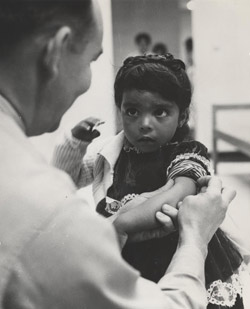WHO recognition for University of York research centre
A research centre at the University of York has been given formal recognition by the World Health Organization.
The WHO has designated the University’s Centre for Global Health Histories (CGHH) as the WHO Collaborating Centre for Global Health Histories in recognition of its proven track record in assisting the organisation to implement its work and achieve its goals. The designation provides the WHO with access to the centre’s world class research.

At the US-Mexico border, a Health Officer vaccinates a young traveller (credit: WHO)
CGHH, which is part of the Department of History at York, has been made a WHO Collaborating Centre for the next four years and the status is renewable. The Collaborating Centre will focus on seminar organisation, knowledge generation, policy evaluation, public engagement and staff training, working with the WHO Headquarters and Regional Offices on these activities on an independent basis.
The Wellcome Trust has given generous support to all these initiatives. These joint activities are at the heart of the WHO’s work towards the global expansion of universal health care and health equity, while seeking to understand the complex social drivers that will better help achieve these goals.
The University of York will benefit from increased visibility and recognition by national authorities, and greater public attention. The collaboration will also lead to greater opportunities to exchange information and develop technical co-operation with other institutions at national and international levels.
The Centre for Global Health Histories is a member of the Humanities Research Centre at the University of York, contributing to its mission to foster inter-disciplinary research locally, nationally and internationally. It is funded by the University and the Wellcome Trust.
Head of the Department of History at York, Professor Stuart Carroll, said: “We are proud to be working with the WHO. The designation marks an important step for historians, as historical research becomes embedded into the evaluation of global health care programmes. It is recognition of the important role that high quality historical research can play in the formulation of policy."
The Director of CGHH, Professor Sanjoy Bhattacharya, who has been appointed Head of the WHO Collaborating Centre for Global Health Histories, said: "We have worked with the World Health Organization since 2010 to create long-lasting links between international health and development agencies, and academic bodies across the globe. We have a shared commitment to ensure that work related to public engagement, independent policy evaluation and the creation of global alliances for the promotion of health remains unaffected in a changing world. Generous support from the Wellcome Trust has been central to this collaboration. We look forward to working with an ever-expanding network of academic and policy partners to widen our activities."
Dr Hooman Momen, the Coordinator of WHO Press and WHO Global Health Histories, added: “I welcome the designation of the Centre for Global Health Histories (CGHH) at the University of York as the newest WHO collaborating centre (WHOCC) joining more than 800 highly regarded academic, scientific and government institutions in over 80 countries, supporting WHO programmes and priorities. Professor Bhattacharya and the CGHH have been solid WHO allies for years, helping WHO to implement its mandated work and achieve its current goals in the field of Global Health History.”
Clare Matterson, Director of Medical Humanities and Engagement at the Wellcome Trust adds: “The Wellcome Trust is committed not only to driving improvements in health through biomedical research, but also to exploring the role that historical research and the medical humanities have to play within science and society.The Trust has been proud to support the work carried out by the CGHH and by Professor Bhattacharya, and we are therefore delighted by the formal recognition granted by the WHO, representing further acknowledgement of the importance of medical history to the future of global health.”
Further information
- Media contact: David Garner +44 (0) 1904 322153
- For more information about the Centre for Global Health Histories at the University of York, please visit www.york.ac.uk/history/global-health-histories
- For more information about the World Health Organization, please visit www.euro.who.int
- For more information about Wellcome Trust please visit www.wellcome.ac.uk
